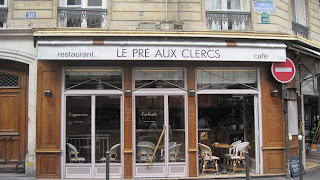 |
| [July 2012] |
Another notable member of the Lost Generation was F. Scott Fitzgerald. He had already garnered literary success with his first novel This Side of Paradise (1920), But it was upon his move to Paris in 1924 that allotted him influences that would forever shape his literary career. During this decade in Paris Fitzgerald’s rise as a prominent literary figure saw its greatest development, namely with the publication of The Great Gatsby, which he started in New York but reshaped in Paris until its completion in 1925. Fitzgerald shared an apartment across the Jardin du Luxembourg on 58 Rue de Vaugirard with his wife Zelda, pictured above, also seeking inspiration from the gardens as Hemingway did. Interestingly, Hemingway met Fitzgerald at a bar, and they shared a close friendship until their falling-out years later--which seemed to be a trend for Hemingway among the members of the Lost Generation. Hemingway’s initial opinion of Fitzgerald was surely not favorable, as he viewed him as un-masculine, delicate, a heavy and unmanageable drinker, unable to control his wild, and arguably insane, wife Zelda, and even more biting was his view that Fitzgerald was not “...a serious writer.” (Hemingway 155). This all changed, however, after Hemingway read Fitzgerald’s manuscript of The Great Gatsby, in which the extraordinary nature of the novel quickly humbled Hemingway’s mockery--a rarity for a man with a tough exterior shielding a fragile ego.
 |
| [July 2012] |
Right around the corner of the Hôtel d'Angleterre where Hemingway spent his first night in Paris, is a little cafe on Rue Bonaparte called Le Pré aux Clercs, a popular watering hole Fitzgerald and Hemingway shared many a drink. In A Moveable Feast, Hemingway also fondly remembers his friend when speaking of a road trip they took together to pick up a car Zelda left in Lyon, and recalls being enthusiastic about being in the company of an older and successful writer.
For the duration of their short-lived friendship, Hemingway became a confidante of sorts to Fitzgerald, who came to him frequently with complaints of his uncontrollable wife Zelda. No doubt she was the original proprietor in emasculating her husband, allegedly telling him no one would want to have an affair with him due to the size of his genitals. As the story goes, Hemingway checked for himself and conclusively told his fragile comrade that it was not so. Hemingway would often sit at cafes with Fitzgerald pleading with him that his wife was stifling his literally career. Hemingway’s concerns were not unfounded as Zelda frequently drained her husbands pockets to support her lavish lifestyle and nights of partying. They would also sit together at cafes discussing their latest works, giving feedback, criticism, and sometimes brutal honesty. Despite Fitzgerald’s literally and figuratively draining wife Zelda, and his very apparent drinking problem--probably brought on by his handful of a wife Zelda, of which Hemingway often pointed out--he still managed to produce some of the best literary works to come out of the 20th century, owed in part to his fellow compatriots and the intangibles found within the city of Paris.

No comments:
Post a Comment